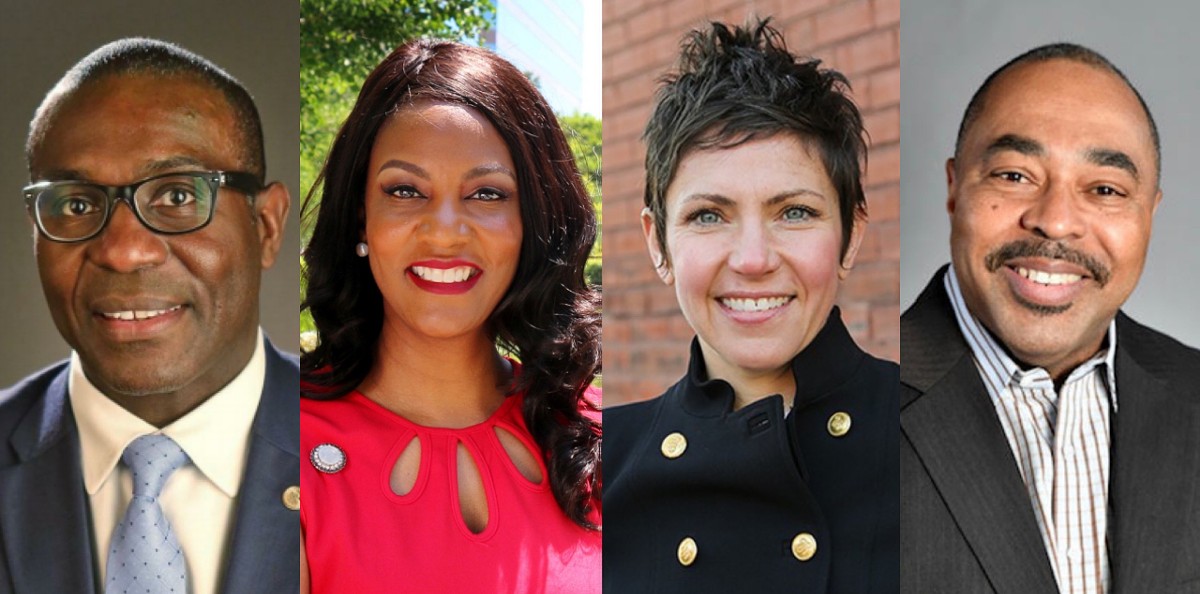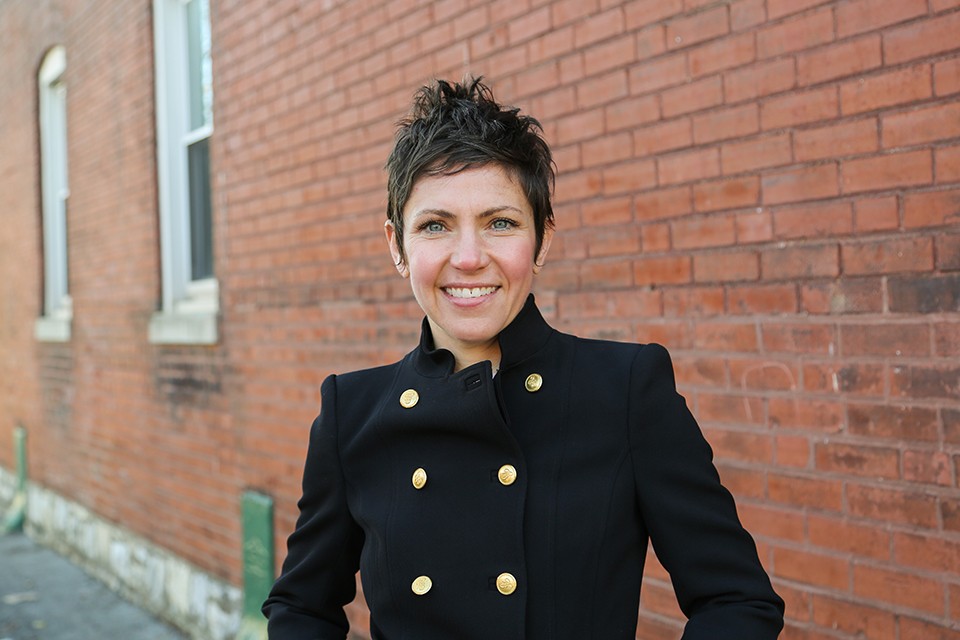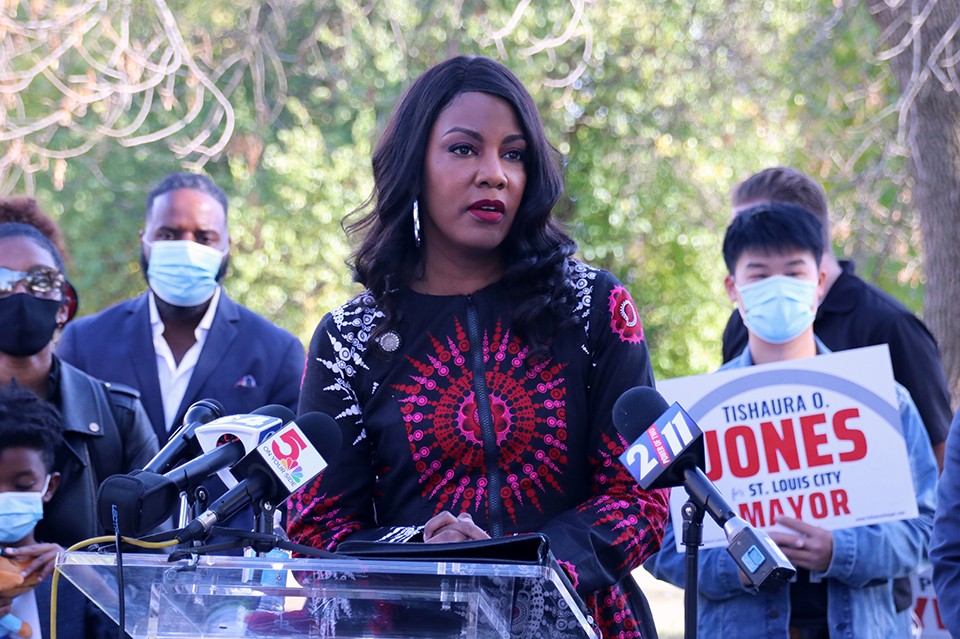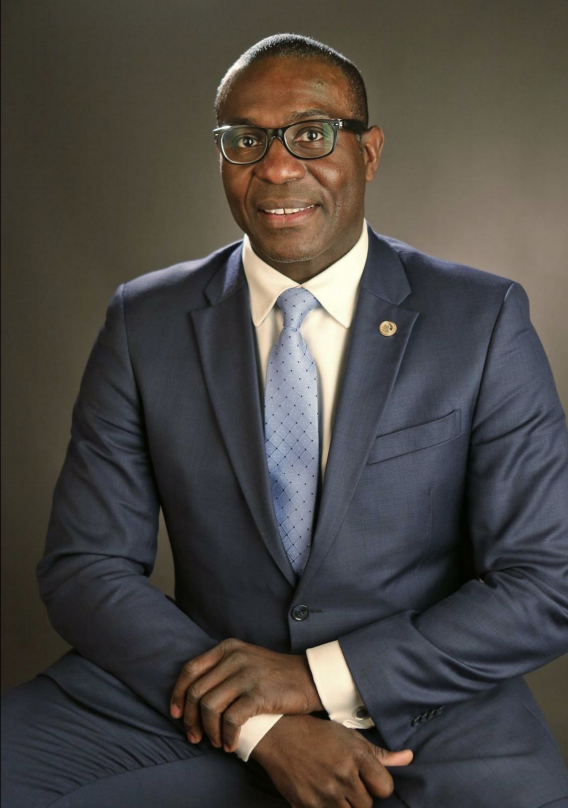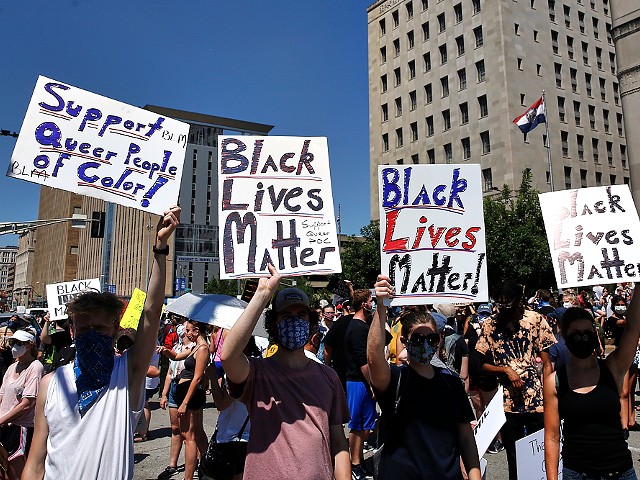Politics in St. Louis can mean many things — frustrating things, mostly — but until now, there had always been perfect clarity about what it meant to win the primary, or first round, of a local election: It meant everything.
That's because the city's elections are like a joke that everyone's in on, all setup and no punchline. Only one party exists in the city as a serious political or governmental force, meaning all battles of policy take place inside a Democratic tent that has its own bounds of left, right and center — alignments that at times only vaguely resemble their national counterparts.
On paper, the city maintained a two-stage election process, with voters winnowing the field in the primary to one candidate per party, followed by the finalists battling it out in the general.
Functionally, though, the election ended at the primary with the Republican candidate serving as little more than an afterthought in the general election. That's how you get nine Democratic mayors of St. Louis going back more than half a century. The last Republican mayor left office in 1949. In 2001, when former mayor Francis Slay won his first term, he beat his Republican opponent with 87 percent of the vote and spent the next three consecutive elections walloping Green Party candidates by huge margins.
So the partisan farce of the general election has gone on for decades — but in 2021 that system is gone, replaced with two-stage "approval voting" system that adds a new instruction to the ballot: "Vote for AS MANY names as you approve of in each race."
On March 2, for the first time in the city's history, a new kind of election will end with the top two vote-getters going head-to-head in a runoff on April 6. Also a first: There are no Democrat or Republican identifications on the ballot. Party labels have been erased, resulting in a non-partisan showdown for the leadership of a deep blue city whose voters went 82 percent for Joe Biden.
No such landslide is expected here. Three candidates — Lewis Reed, Tishaura Jones, and Cara Spencer — are established characters in the Democrat-controlled city government. Andrew Jones, a business development and marketing executive for a local energy company, ran for mayor in 2017 as a Republican and was roundly defeated by Democratic primary-winner Lyda Krewson.
In November, Krewson opened up the race when she announced she would retire from politics after the end of her term. Now, for the second consecutive election, St. Louis is guaranteed a brand-new mayor and administration.
The stakes couldn't be higher: Between historic homicide counts, dwindling population, an imperiled school system and jails in crisis, St. Louis is at a crossroads of critical junctures. In separate interviews with the Riverfront Times, all four candidates detailed their visions for a city bursting with problems and potential — while making the case for why voters should approve them on the March 2 ballot.
No one knows for certain what this untested, unprecedented primary will produce. What it will mean, then, is up to you.
— Danny Wicentowski
Read on to meet the candidates.
The Alderwoman: Cara Spencer
Cara Spencer, 42, began her tenure as 20th Ward Alderwoman in 2015, at a time when Lewis Reed was finishing this third term as board president and Tishaura Jones had already spent four years as a state representative and was well into her new job as city treasurer.
Spencer's opponents may have decades more political experience, but she's quickly built a reputation as a city watchdog against the mishmash of economic development priorities that have long toxified the city's legislative body. It's an arena where the go-to strategy involves pouring tax incentives into development projects that, in the process, deprive the school system of revenue.
Two years after she took office, Spencer ran headlong into the attempt to privatize St. Louis Lambert International Airport.
"It was just so emblematic of how the city goes about its business, in a vacuum, siloed off and with a short-term game in mind," Spencer says. "We go in without any sort of risk analysis, or even valuation of the project."
"Instead," she fumes, "we took the easy route."
The airport privatization fiasco ended in 2020, with Lambert remaining under city operation. Along the way, it became an example of a kind of collaborative dysfunction that turns St. Louis government into a wasteful, pointless spectacle.
It also demonstrated what a St. Louis mayor can do, and what chaos they can produce: The aborted flight to privatization started in late 2017 as one of the final acts of outgoing mayor Francis Slay, who entered the city into an agreement with free-market enthusiast Rex Sinquefield; in turn, the billionaire hired the high-priced consultants needed to prepare, market and eventually lease St. Louis' airport to a third-party owner.
The idea, supposedly, would net the city $1 billion and fix all its economic problems. A successful lease would trigger a lucrative payback for Sinquefield and the consultants, while also enriching the operators' lobbyists — a cast that at the one point grew to include a certain former St. Louis mayor and private-sector attorney named Francis Slay.
Slay's role, along with the seemingly legalized kickback scheme to Sinquefield, horrified Spencer. That's not the sort of deal a St. Louis mayor should make, she says.
"The mayor should run an agenda, a set of priorities, a clearly articulated vision for the city," she says, explaining that her agenda would tackle public safety with "a regular accounting of policies and revisions" as the city worked to reduce violent crime and "increase an investment in our community that needs it most."
Further distinguishing Spencer from her opponents, the alderwoman has run a notably aggressive campaign towards Lewis Reed.
"The Reed record? Cronyism, corruption and crime that's out of control," intones a 30-second ad that started airing last week. The narration continues as news clips about airport privatization and the city's homicide rate flashing by. The ad abruptly pivots to crime victims talking about their losses — "Politicians like Lewis Reed had their chance," one man says, after describing the death of his son — and ends on Spencer facing the camera, delivering her pitch: "No matter where you live in St. Louis, I'm committed to keeping you safe."
Reed's campaign shot back, accusing Spencer's campaign of using "darkened, grainy image and racial fear tactics" and "a sad old racist trope — blaming Black leaders for crime."
Spencer defends the ad, saying that Reed bears responsibility for failing to address the rise in violent crime during his long tenure in government. Even before the current campaign, Spencer and Reed had publicly tangled on airport privatization and, that same year, the city's approval of a $64 million bond to renovate the Scottrade Center for the Blues, consigning city dollars to benefit a team currently worth $530 million.
Still, Spencer says she supports Cure Violence, the recently launched anti-violence strategy principally backed by Reed, though she believes it would work most effectively paired with "focused deterrence" — a strategy briefly piloted in St. Louis in 2012. The plan involves focusing police and other resources on the small number of people in an area "at high risk for being involved in violent crime."
As with many things about St. Louis, Spencer laments the lack of planning that pervades the city's efforts to affect the quality of life for some 300,000 residents. Reed, she alleges, has proven himself an obstacle, not a problem-solver.
"We have no discernable agenda," she says of the board under Reed. "It is dysfunctional beyond my wildest imagination. He has been at the helm all these years, and what do we have to show for it?"
Still, the next St. Louis mayor is going to face challenges much bigger than past clashes.
There's the issue of the Workhouse, which Spencer supports closing. The next mayor will also face the aftermath of the pending closure of seven schools, despite having no direct control over the St. Louis Public Schools system.
Solutions will take a lot of planning, requiring long-term moves and thorough analysis, Spencer says. All four candidates agree on that — but Spencer argues that she's the one who has most proven she's not just principled but is willing "to do the work."
St. Louis has a wealth of problems; that's certain. But where there's a plan — and a mayor to guide it — there could very well be a way. Spencer wants to be the one to get it there.
"We have got some real structural issues, and the fact that the region hasn't grown in four decades is problematic," she says. "I have tremendous hope for St. Louis. We have phenomenal architecture, our human capital is fantastic, our culture, the people who live here and just the amenities that we have — we're sitting on a goldmine."
— Danny Wicentowski
The Treasurer: Tishaura Jones
No one was more afflicted by St. Louis' old election system than Tishaura Jones.In March 2017, the all-important Democratic primary swelled with seven candidates, stretching the election to its absurd breaking point as five sitting public officials — among them Alderwoman Lyda Krewson, Board of Aldermen President Lewis Reed and Jones, the city treasurer — vied to see who would be the first St. Louis mayor of the 21st century not named Francis Slay.
In such a divided field, Krewson needed just 32 percent of the vote to beat Jones, who missed the mayorship by a hair's breadth of 879 votes. Jones' supporters groused at what could have been — if only their candidate had competed against Krewson directly, or at least in an election that didn't feature as many candidates as days in the week.
Four years later, Jones is coming off her third win as treasurer. In the same election, St. Louis replaced the Clay dynasty in the U.S. House of Representatives with activist and protester Cori Bush. Voters also reelected Kim Gardner to circuit attorney despite a strong opponent and bitter opposition from St. Louis' largest police union.
"It sends a strong signal," Jones, 48, says of the 2020 contests. "The people who showed up for that election believe in the leadership of Black women to lead our city and region forward."
Still, Jones acknowledges that she can't help but view the struggles of Krewson's administration through the what-if lens of hindsight.
It was that way on the morning of February 6, when 117 inmates in City Justice Center overtook two of the downtown jail's units, smashed fourth-floor windows and seized the attention of a stunned city with homemade banners and small fires.
Hours later, Jones took to Twitter to address the uprising. "Had I been Mayor back in 2017," she wrote, "we wouldn't be in the situation we are in today."
In an interview, Jones granted that the revolt had been preceded by months of pressure over pandemic crowding, with conditions worsened by the stalled legal system that lengthened the stays of those awaiting trials and court hearings.
Still, she stands by her statement. In an alternate St. Louis under a Jones administration, she says "We would have been tackling the root causes of crime more aggressively since 2017. We would be preventing people from even entering the system in the first place, and working with the Circuit Attorney's Office on some real, tangible criminal justice reform."
In that universe, it would have been Mayor Jones, not Krewson, to face the burst of protests in late 2017 after the acquittal of a cop charged with murdering a suspect.
"We wouldn't have been 'kettling' protesters," Jones continues, referring to a police-engineered mass arrest that encircled protesters and uninvolved downtown residents during a night of demonstrations. Those swept up by riot police included an undercover officer named Luther Hall, who later sued the department over a brutal beating delivered at the hands of his fellow officers.
"This is why the city had to pay Luther Hall $5 million," she adds, punctuating her point. In her view, the status quo of public safety in St. Louis has to stop, not just because of the tangible losses in settlements and embarrassment, but because of what it costs in trust.
Of course, Jones isn't running to be the mayor four years ago. The St. Louis of today has enough problems.
As with all the candidates, her platform highlights public safety. Like the plan put forth by fellow candidate and alderwoman Cara Spencer, it features a rollout of a "focused deterrence" plan, though Jones' platform describes a model to wrap police services into a "community-first" strategy that would include "social service providers, prosecutors, faith organizations and local businesses" to stem the city's violent crime.
But Jones has distinguished her campaign on other issues. She has made decriminalizing sex work a written part of her platform, and her plan for reallocating the Workhouse budget includes redirecting millions of dollars to substance abuse programming.
Despite the setbacks, Jones maintains the Workhouse needs to close. Still, with the Criminal Justice Center in crisis (including Public Safety Director Jimmie Edwards' revelation that "the locks don't necessarily lock"), she has concluded that can't happen as fast as previously planned.
The jail's delayed closure is just another example, she says, of the way St. Louis "kicks the can down the road," a dynamic that compounds failures as city leaders wait to react to whatever next thing they haven't prepared for.
"When we talk about the things that are plaguing St. Louis, we seem to have an either/or, or scarcity mentality," Jones says. "We need to have a mentality that we can handle and concentrate on multiple things at a time."
To Jones, the solutions aren't hiding in new plans or commissions — she lists several reports published by coalitions and non-profits over the past six years, thousands of pages of analysis devoted to policing, economic development and the racial inequities between the city's south and north.
"That's the paralysis of analysis," Jones quips. "What we need to do is take those calls to action, put them together in a strategic plan and go forward with dates and deliverables."
Some challenges still loom unaddressed. Jones cites the seven planned school closures amid an ongoing decline in student population. St. Louis, she says, "has not been a good partner with our school system."
While the mayor can't change school policy directly, Jones says the mayor's office needs to be an actual presence in the school system and its future, a genuine partner, not a distant voice that wanders into the classroom long after the bell has rung.
It's the call to service that Jones says would make her mayorship unlike anything in the city's history, and not just because she'd be the first Black woman to lead it.
"People always say they want change, but they don't," she says. "So, we have to be transformational in our approach, and that's about leadership."
It's like that Bible verse, she suggests, the one about "pressing toward the mark."
"How do we keep pressing forward? You just have to keep pushing," she adds. "Because we know that bigger, and better, is indeed possible."
— Danny Wicentowski
The Board President: Lewis Reed
Lewis Reed, 58, might be St. Louis politics personified. In 2019, twenty years after first taking office as a 6th Ward Aldermen, he won an unprecedented fourth term as president of the Board of Aldermen. It's a position he compares to "second-in-command of a massive corporation" — though it is uniquely powerful in its own right.
From his perch in City Hall, Reed has managed to carve his own path, controlling committee assignments and the flow of lawmaking while also holding one of the three key votes on the city's ultra-powerful budgetary board.
But while he is one of the most powerful figures in government, Reed says he understands residents' worries about the historic rise in homicides and the distrust between crime victims and police. He acknowledges that constituents are frustrated with a government he's been part of for decades.
It's a frustration that he says he shares.
"Getting new things adopted and implemented in the city is something you can actually get done in that mayor's office," he says. "Part of the challenge is breaking through some of these traditional ways and the ingrained things that have kept us stagnating for so long."
Reed pushes back on any notion that he's underused the power of his present office. In a government system reliant on coalitions and soft power, he says that as board president, "you don't have the power to enter into a magazine subscription on your own."
Things would be different in a Reed administration, Reed says. He mentions the long-struggling efforts to deploy body cameras to the city's officers, which had stalled for years before rolling out at the end of last year. "The mayor could do that in a day," he charges.
As board president, he says, "I've done everything in my power to lay the groundwork to put these things in practice. And if you have a mayor that has no understanding, it's taking someone and plopping them in the seat of an F-15, and they have no idea how to fly a plane."
Then again, Reed tends to be his own pilot — and his mercurial style has alienated potential allies in the city's legislative and executive branches. For instance, in the city's contentious exploration of airport privatization, Reed played wildcard as he bounced between obstacle and booster, his machinations separate from those of Mayor Lyda Krewson.
After Krewson officially killed the privatization effort — amid opposition that the plan would gamble the city's most valuable asset while pouring millions into the pockets of conservative billionaire Rex Sinquefield — Reed led attempts to resurrect it as part of a scheme to force the city to lease the airport's operations in exchange for, supposedly, $1 billion in improvements to north city. (After publication, a spokesperson contested this description, saying that Reed filed a board bill to put privatization on the ballot as a response to an outside petition process that eventually was withdrawn under legal concerns.) The plan never got off the ground.
Still, Reed maintains that he can marshal the powers of the office to action. "I think it's clear that my leadership style lends itself better to coalition building," he says.
But when conditions change, Reed believes that walking away from a coalition you helped build can be the right thing to do. Take the efforts to close the Workhouse, the city's maligned medium-security jail, which costs the city $8 million to run annually. While both Tishaura Jones and Cara Spencer say flatly they would close the facility if elected, Reed has traced a dizzying path of positions: First opposed, Reed later joined the activists and sponsored the unanimously passed board bill to close the Workhouse by the end of last year.
That didn't happen. Amid prison officials' concern about overcrowding during a pandemic and a succession of riots and uprisings at the city's other jail, Reed snapped back to what he argues is a more pressing reality — avoiding the spread of infection and potential unrest in the jails — than the one backed by criminal justice reformers.
"The world has changed," Reed says, "Anyone who says they would automatically go in Day 1 and close the Workhouse couldn't be more irresponsible."
What remains unchanged for Reed, through his decades in government and multiple mayoral runs, is his focus on violent crime. He spent years boosting the "Cure Violence" program, which rolled out this year with teams of "violence interrupters" deployed to the city's most violent neighborhoods.
Reed often talks about the effects of violence on his own family. In 1982, his brother was murdered by unknown gunmen in Joliet, Illinois, where Reed had grown up among nine siblings. In 2018, Reed says his nephew was found "shot, killed and left burning in a dumpster in the city of St. Louis." One year later, his son was held up at gunpoint and nearly robbed close to the family home in Compton Heights.
"I've co-hosted candlelight vigils for all these families. I've attended the funerals. I take that stuff very, very personally," he says. "Praying by my brother's hospital bed as he passed away from a gunshot wound to the head — I know what that feels like. And I don't want families to have to go through that."
But the killings continue. The 262 homicides recorded in 2020 nearly broke the single-year record set in 1993, while some 70 percent of cases go unsolved. Reed says he wants to see an expansion of the Cure Violence program to stop killings before they happen; he also supports additional funding for the "Justice for St. Louis Families Fund" which provides $10,000 awards for tips that lead to homicide arrests.
He acknowledges, though, that things need to change in St. Louis. The city can't afford to repeat its last decade of violence and City Hall gridlock.
St. Louis, he says, needs a "gut rehab."
"This is what drives me to run for mayor," he continues. "The city is very, very slow to change. And it's going to take someone sitting in that executive role that has the understanding, the motivation and ethic to change it."
— Danny Wicentowski
The Businessman: Andrew Jones
Andrew Jones says he has the skills — a particular set of skills — St. Louis needs in its next mayor.
"Pretty much like the movie Taken, where the gentleman said I have a unique set of skills to put me in a position to help lead the city in the turnaround that's needed," he says, one of three times he would reference the Liam Neeson action thriller while speaking to the Riverfront Times.
Jones is an outlier in the four-way race for mayor. He's the only candidate who isn't in city government and the only registered Republican, although that's a political distinction he detests.
In a wide-ranging interview, the 60-year old businessman discussed his thoughts on the city's crime problem, Confederate monuments, the recent jail uprisings and his faith in the 'bootstraps' model for reaching Taken-level success.
Jones, a Metro East native, grew up in a typical working-class family in East St. Louis and attended Catholic school until college at Lincoln University and later Washington University, where he is currently working toward another master's in economics. He plans to obtain his Ph.D. in economics "before I'm gone from the planet," he says.
Jones now lives in the Botanical Heights neighborhood and serves as vice president of business development at the nonprofit power company Southwestern Electric Cooperative. He ran for mayor in 2017 as the Republican candidate and lost by 50 percentage points to then-Alderwoman Lyda Krewson, but he otherwise has little political experience. Instead, he relies on his can-do attitude to sway undecided voters.
"My background has been one of success, one of actually pulling oneself up by their bootstraps ... As I spoke earlier, in the movie Taken, 'I have a unique set of skills' that puts me in a position to be able to help turn this city around."
Pressed on whether the "pull oneself up by their bootstraps" model really works for everyone (critics argue that it ignores systemic inequalities and puts the blame on oppressed people for not being more successful), Jones says that "if I am a rat catcher in India, my plight is set in stone," but because of the "phenomenal" system in the United States, anyone in this country can be successful if they simply work hard enough.
Jones includes those who "grew up as a Black person in the United States of America," like himself.
"I believe my ancestors would be turning over in their graves, looking at the lack of productivity that current Black folks to a large degree have put themselves in," Jones says.
Jones says St. Louis is currently "at the point of falling into an abyss," comparing our plight to that of infamously bleak Gary, Indiana. He blames the city's current leadership, "or lack of leadership."
Jones insists if he had been mayor the past four years instead of Krewson, he would've handled many things differently. Off the top of his head, Jones' first major change would've been Krewson's response to taking down confederate statues. He contrasts the situation with reminders of Nazi concentration camps in Germany.
"If we go to Auschwitz, no one's talking about tearing down any of the buildings that were associated with the deaths of millions of Jews ... Jews are there, they're looking in remembrance, and understanding what happened. ... Others that travel and go there, even if they're sub-groups, Germans or whatever you wanna say, they go to Auschwitz, they look, and they pay reverence to the fact in history that this took place," he says.
Instead of a "knee-jerk" reaction, Jones says he would've assessed whether the statues should be taken down, and that public opinion wouldn't have much weight in the decision-making process.
Jones also believes the recent prison protests at the St. Louis Justice Center would've gone down differently if he were in charge. In fact, he says they wouldn't have happened.
"We would've never gotten there, because my No. 1 position is that we should not close the Workhouse because we have not had data to substantiate closing the Workhouse. I've said it four years ago; I'm lamenting it now, when everyone's saying we should close it," he says.
Activist organizations have put together detailed reports on the closing the 55-year-old jail — officially known as the Medium Security Institution — including budget breakdowns for redirecting funding towards better staffing at the new downtown jail and social programs to combat the roots of crime as they push city officials to move forward with closure plans. Through the pandemic, the city's jail population decreased sharply and the majority of remaining detainees were shifted to the City Justice Center.
Jones says that he would have kept the Workhouse fully operating to head off any overcrowding at the City Justice Center. He claims that this would have prevented the protests. Advocates for detainees say the inmates were revolting against a range of problems, including inadequate COVID-19 protections and harsh treatment by guards. City officials deny those incarcerated in the jail have been mistreated and align with Jones on the theme of overcrowding.
"Four years ago, if I had been mayor, I would've taken care of that issue so that we could move on to the more pressing things, like providing optimum municipal services to our citizens," Jones explains.
Jones, who along with Board of Alderman President Lewis Reed has been endorsed by the St. Louis Police Officers Association, has made ending violent crime the focus of his campaign, saying that "after you get that done, everything else falls in line."
However, when asked how he would accomplish that, Jones struggles for specifics. He says increasing police funding and backing the blue could be vital. Jones also says that most violent crimes in St. Louis are committed by a small group of people, all of whom are involved with drugs and gangs. He believes that current city leadership knows exactly who these offenders are but they're too afraid of political backlash to have them arrested.
In Jones' telling, city officials worry about pushback after "all the things that happened this summer, from people burning and rioting in all of these cities because of George Floyd's issue and the other things that have happened. They don't want that backlash."
If he had the opportunity, Jones says, he would arrest them all on his first day in office, as these criminals "can't be saved by social workers" or even "Dr. Phil." It's unclear how he would make that happen.
Jones' positions break sharply from the platforms of the other candidates in the race, particularly Alderwoman Cara Spencer and Treasurer Tishaura Jones who support closing the Workhouse and have advocated for criminal justice reform as opposed to a police crackdown. While promoting conservative Republican talking points (largely the same platform from his 2017 mayoral run), he insists he is a non-partisan candidate.
So far, he's tracking behind his opponents. A recent poll by Democratic consulting group Show Me Victories showed him in last place with 5 percent of respondents naming Jones as their first choice.
Jones is undeterred. He says, "I will continue to be successful at any endeavor that I get involved with."
— Riley Mack
Editor's note: This story was altered after publication to correct the number of Lewis Reed siblings and to note that his campaign contests the story's description of his role in the fight over airport privatization back.

